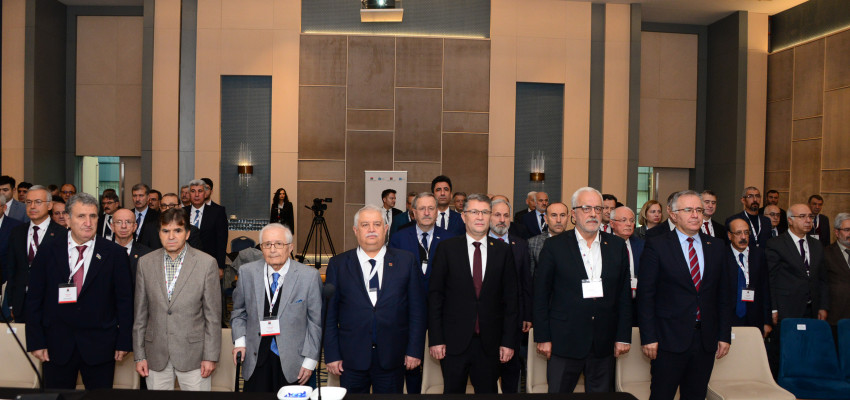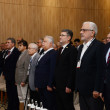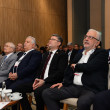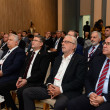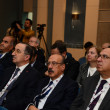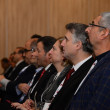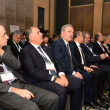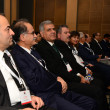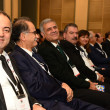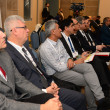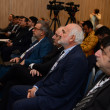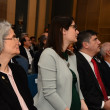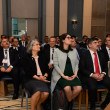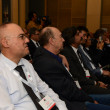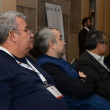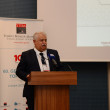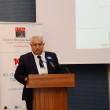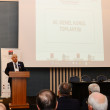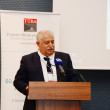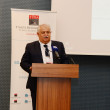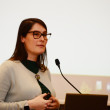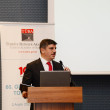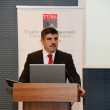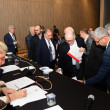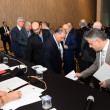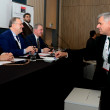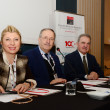TÜBA 60th General Assembly
TÜBA's 60th General Assembly and General Assembly Conference was held at The Ankara Hotel on Saturday, December 2 with the participation of Academy presidents, TÜBA members, rectors and heads of institutions from abroad.
5 Council Members and 19 New TÜBA Members were elected to TÜBA
With the participation of 91 Academy members, Prof. Dr. Mehmet Emin Aydın, Prof. Dr. Kadriye Arzum Erdem Gürsan, Prof. Dr. Fatih Gültekin, Prof. Dr. Ertuğrul Kılıç and Prof. Dr. Bekir Salih were re-elected as Council Members.

Prof. Dr. Erol Arcaklıoğlu from Ankara Yıldırım Beyazıt University (AYBÜ), Prof. Dr. Ahmet Faruk Aysan from Hamad Bin Khalifa University, Prof. Dr. Tulin Gençöz from Middle East Technical University (METU), Prof. Dr. Vural Gökmen from Hacettepe University, Prof. Dr. Cengiz Sinan Özkan from the University of California Riverside, Prof. Dr. Mustafa Şahmaran from Hacettepe University, Prof. Dr. Ali Rıza Yıldız from Uludağ University were elected as Full Members;
Prof. Dr. Şener Aktürk from Koç University, Assoc. Prof. Dr. Abdurrahman Atçıl from Sabancı University, Prof. Dr. Ali Balcı from Sakarya University, Assoc. Dr. Ertuğrul Başar from Koç University, Prof. Dr. Esra Çapanoğlu Güven from ITU, Assoc. Dr. M. Talha Çiçek from Istanbul Medeniyet University, Assoc. Prof. Dr. Engin Durgun from Bilkent University, Assoc. Prof. Dr. Mustafa Evren Erşahin from ITU, Prof. Dr. Bahar Güntekin from Istanbul Medipol University, Prof. Dr. Şaban Nazlıoğlu from Pamukkale University, Assoc. Dr. Mustafa Serdar Palabıyık from TOBB University of Economics and Technology and Prof. Dr. Mustafa Yücel from METU were elected as Associate Members.

"TÜBA's work is always a source of reference for us, the decision-makers," said Mehmet Fatih Kacır, Minister of Industry and Technology.
Minister Kacır, who was unable to attend the General Assembly of the Academy due to his previously scheduled program, said in his message: "On the occasion of the 60th General Assembly of the Turkish Academy of Sciences, I sincerely congratulate you for your valuable contributions to science and scientists. As we take firm steps towards the future in the 100th year of our Republic, we follow and support TÜBA's work and innovative researches that contribute to the scientific development of our country. I attach great importance to your representation of our country in the world of science within the framework of scientific diplomacy and I appreciate your active participation in the activities of umbrella organizations. TÜBA's work is always a reference source for us, the decision makers. Your reports, works and scientific activities show us the path we should follow within the framework of your science-based advisory role. I would like to express my sincere gratitude to all esteemed scientists who have contributed to your work."
Academy presidents and representatives from abroad also attended the meeting.
Prof. Dr. Isa Habibbeyli, President of the National Academy of Sciences of Azerbaijan, Dr. Darkhan Bilyalov, Vice President of the Academy of Sciences of Kazakhstan, and Prof. Dr. Asif Šabanović, Secretary General of the Academy of Science and Arts of Bosnia and Herzegovina, who were invited to the 60th General Assembly on the occasion of the 100th anniversary of the founding of the Republic of Türkiye, expressed their pleasure to take part in the Academy's General Assembly Meeting on Türkiye’s 100th anniversary and thanked for the invitation.
TÜBA President Prof. Dr. Muzaffer Şeker: "We need to work for our country and humanity."
In his speech at the General Assembly, TÜBA President Prof. Dr. Muzaffer Şeker reminded that Türkiye experienced earthquakes in 2023, which were described as the disaster of the century. Stating that a heavy picture emerged after the earthquake, Şeker said, "We have to think that we also have a responsibility for the lives lost in the earthquake. The cost of the earthquake will bring significant contractions and restrictions. Scientists will also be affected. We need to act by recognizing this rationality and stretch our feet according to our quilt. We need to work harder. We need to know that we can cover this cost together."
Şeker said that Türkiye is located in a ring of fire due to its geographical location and this poses a risk. Referring to Israel's attacks on Palestine, Şeker said, "It was inevitable that Palestine, which has turned into an open prison, a region where the population in such a shrinking region cannot use their natural human rights, would eventually collapse. In this regard, we are experiencing a process in which the countries in the world that define themselves as 'developed', in my opinion, do not think of themselves as developed, but only within the framework of their own interests and imperialist thoughts, in an environment where they close their eyes,ears,ignore and lock their mouths, we are experiencing a process in which humanity fails in class. There is only one dimension to applaud here, the people who are resisting and the people other than politicians who support them from all over the world. In this regard, the conscience of humanity is warning to those who are dragging their feet, warning that this course is not right, that they are on a wrong path."
Şeker pointed out that the dark clouds that pose a risk of World War 3 should be dispersed as soon as possible, and said that history will repeat itself if lessons are not learned.
Emphasizing the need to be more careful in this period when Türkiye’s 100th anniversary is celebrated, Şeker said. "We must motivate ourselves, our friends and our students to work harder to protect the country. The only thing we can do is to work and produce in the light of science, in pursuit of the truth, to be strong, to remain independent, to support setting our own agenda by getting rid of the influence of others. We know that, like hungry wolves, there are some people around us who are waiting to attack when weakness is shown. May Allah never harm the state and the nation. We lived through the War of Independence and we know the difficulties of it. We also know from our ancestors how difficult it was to come here from those days. We need to work and speak the truth for our country and humanity in order not to fall into the hands of the one-toothed beast that we have seen in the lines of Mehmet Akif Ersoy, who showed privilege by not including the National Anthem in his Safahat and said 'May Allah not let this nation write another National Anthem'."
TÜBA Young Academy Member Assoc. Prof. Dr. Eliza Gheorghe "Market of Doom: Proliferation and the Logic of Nuclear Trade"
TÜBA Young Academy Member, Bilkent University Faculty Member Assoc. Prof. Dr. Eliza Gheorghe gave the plenary lecture "Market of Doom: Proliferation and the Logic of Nuclear Trade".
In her book, soon to be published by Cornell University Press, Gheorghe analyzes a new theory of proliferation using mixed methods to explain how states acquire nuclear weapons. In the book, Gheorghe argues that the interaction between suppliers, buyers and regulators in the nuclear market affects the proliferation of nuclear weapons. Speaking at the General Assembly conference, she explained her work as follows: "Suppliers' fear of losing business to commercial competitors gives buyers leverage to bargain for lower prices, better products and more flexible terms of use. Having external options encourages proliferation by enabling proliferators to acquire the technology needed to develop nuclear bombs. Great powers act as market regulators trying to limit the spread of nuclear weapons. When the number of parties and the intensity of security competition are low, regulators cooperate to create export control mechanisms such as cartels and limit supplier competition. In multipolar and highly competitive environments, regulators are unable to impose effective controls and favor buyers. Systemic factors thus determine the ups and downs of market regulation and explain why proliferation accelerated in the first half of the Cold War, slowed in the second half, and stagnated after 1990." In summary, Dr. Georghe said the book explains why membership of the nuclear club was limited to 10 states and helps to predict nuclear proliferation in multipolarity.
TÜBA Associate Member Prof. Dr. Yasin Aktay published "Palestine: From Yesterday to Tomorrow"
AYBU faculty member Prof. Dr. Yasin Aktay started his plenary lecture by stating that the world has been witnessing Israel's genocidal aggression against Gaza for almost two months and continued as follows: " Since it started after the Aqsa Flood operation launched by Hamas, many people almost thought that the issue in Palestine started because of this operation of Hamas. However, history in Palestine did not start on October 7th. It has a history that goes back more than a century, and what happened on October 7 is just a consequence of that history. The Balfour Declaration, issued in 1917, envisioned Palestine as a homeland for the Jews scattered throughout Europe."
Underlining that after the British captured Jerusalem in 1917, they gradually helped the Jews to settle there and managed the period leading up to the establishment of a Jewish state in 1949, Aktay said that Jerusalem, which they had dreamed of taking back from Muslims for centuries, was handed over to the Jews. "The establishment of this state was realized after the Nakba, the expulsion and exile of Palestinians from their homeland and the killing of many Palestinians. Since then, Israel's systematic occupation of Palestinian territories has been at the heart of the problem. After the 6-day Arab-Israeli war in 1967, Israel occupied more territory. Since then, it has turned life for Palestinians into a concentration camp with its settlement and occupation practices and its apartheid system against Palestinians. While all this was happening, some international solution plans were discussed."
Explaining that Israel did not comply with any of the negotiations and agreements reached under the mediation of the UN and the US, Prof. Aktay emphasized that Israel adopted the negotiations as a tactic to buy time and distract the world while putting its final occupation plan into effect. As a matter of fact, he said that although some Arab countries, which did not recognize Israel in the past, have recently normalized their relations, this has not softened Israel's Apartheid regime and has contributed nothing but to accelerate its occupation plans even more.
Prof. Dr. Yasin Aktay continued his words as follows: "It is a fact that there is no power left to stand against this expansionism of Israel, which obviously takes its reference from its Holy Book regarding the ultimate goal of this occupation, except the resistance of the Palestinians. The last 50-day war has produced surprising results for this resistance. So much so that we can say that the Palestinian cause, which was thought to be almost over with the Aqsa Flood, will shape the world of the future with all kinds of new surprises."
The General Assembly ended after the presentation of Prof. Dr. Muzaffer Şeker, President of TÜBA, and the expression of opinions and wishes.

